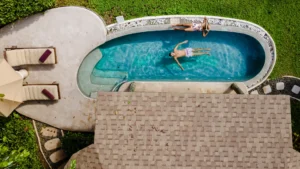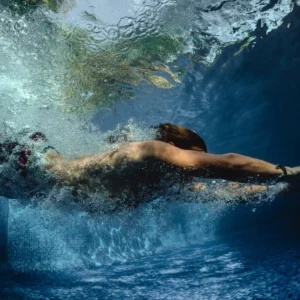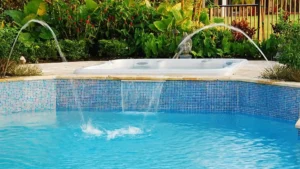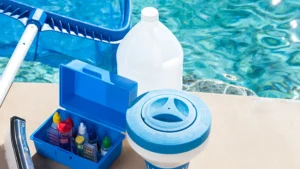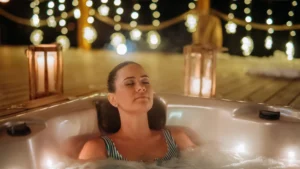
The cartridge pool filter is a filtration system commonly found in private swimming pools, especially above-ground ones. It is popular because it is efficient, easy to use, and simple to maintain. The system operates using cartridges that have pleated media.
These media trap dirt and debris as water flows through them. The filter housing shields the cartridges, preventing damage and ensuring steady water flow with minimal pressure loss.
Types of cartridge filters
There are three main types of cartridge filters for pools. Each has its pros and cons, but cartridge filters are the best choice for both novice and experienced pool owners. They require low maintenance and oversight, while keeping your pool just as clean as the other options.

- Standard cartridge filters are ideal for residential pools because they’re easy to clean and capture debris as small as 10–15 microns.
- Modular cartridge filters (also called quad filters) are perfect for larger pools, offering longer cleaning intervals and excellent filtration down to 5–10 microns.
- Reusable or replaceable cartridges are eco-friendly and convenient, reducing waste and making maintenance simple.
According to the Pool & Hot Tub Alliance, cartridge filters are a highly efficient and low-maintenance option for keeping pool water clean and safe.
Pro Tip: If you’re renovating your pool, consider hiring amenity pool service to install a cartridge filter.
How does it work a cartridge filter?
Cartridge pool filters are most common in spas and smaller pools, but recently, they’re becoming more popular. They’re made from spun polyester and placed inside a tank. These systems work by pushing water from the pool into the tank.
A cartridge filter works like this: A skimmer picks up larger debris. A second basket catches anything the skimmer misses. Then, the water goes through polyester filters, which trap dirt and let clean water pass through, and chlorine helps kill any bacteria that might get through.
Maintenance of the Cartridge filter

According to Pool Center, a clean filter can trap particles as small as 25 microns in size. When they become dirty, you may notice the pressure gauge rise to around 8 to 10 pounds. At this point, the filter needs to be cleaned to become more effective.
Call your local pool service in Dallas, Fort Worth, Miami and more to have them take care of it. However, it’ll probably take up to 6 months before you need to do that, unless you have a smaller filter or recently accumulated lots of debris or algae.
Cartridge filters last about three to five years, and then you just need to ask your local pool service to get a replacement. To ensure that it lasts longer, experiment with how long you run your system each day. It depends on the pool size and how often it’s used, as well as the number of debris and sunlight your pool sees on average.
Pro Tip: A good thing about cartridge filters is that you don’t have to backwash them. Your local pool technician will clean the tank instead. This is helpful for pool owners who want to save water because it can save about 200 gallons each month.
Best cartridge filter for pool
According to Better Homes & Gardens, the Hayward Cartridge Pool Filter is one of the best filters you can buy. It has a large 120 square foot cartridge that makes it very efficient.
It also has a strong flow rate of 120 gallons per minute, which keeps the water clean even when there is a lot of debris. One nice thing about this filter is that it needs little maintenance and does not require a backwashing. This makes it a great choice for anyone looking for an easy and effective option.
FAQs About Cartridge Pool Filters
1. Is a cartridge filter better than a DE filter?
Generally, cartridge filters are easier to maintain than DE (diatomaceous earth) filters. A DE filter, while filtering finer particles down to 5 microns, offers a great filtration backdrop with slightly more maintenance required for the cartridge filter, as it cleans particles down to about 25 microns. Plus, cartridge filters don’t backwash against DE filters, saving some water and effort.
2. Why Does My Pool Cartridge Filter Keep Clogging?
Your pool cartridge filter might keep clogging because of an increased amount of debris, sunscreen oils, algal matter, or inflicting bad water chemistry. Minimize this problem by keeping a good maintenance schedule with our weekly cleaning and maintenance.
3. Which Is Better: DE Filters or Cartridge?
Comparing one against the other, both have their peculiar advantages. DE filters provide from the finest filtration but bear frequent backwashing and the handling of DE powder.
On the upside, cartridge filters are easier to clean save water, and maintain less. For any pool owner putting options for conversation and maintenance with convenience, cartridge filters are most often the overall preferred option.
4. Duration of a cartridge pool filter operation
Ideal cartridge pool filters survive for three to five years under normal usage and water conditions and saving maintenance.
5. How often do I have to clean the pool cartridge filter?
The typical cleaning interval for a cartridge filter is every 4 to 6 months, although heavy pool use, lots of debris, and/or mounting pressure on the gauge may call for frequent cleaning.
6. Can cartridge filters be used for large pools?
Yes, modern cartridge filters can handle large pools. Many manufacturers now produce high-capacity cartridges that work efficiently in pools of all sizes, especially when paired with multi-cartridge systems.
7. Are cartridge filters eco-friendly?
Absolutely. One major advantage is that they don’t require backwashing, which saves up to 200 gallons of water per month. This makes cartridge filters an environmentally friendly option for pool maintenance.

